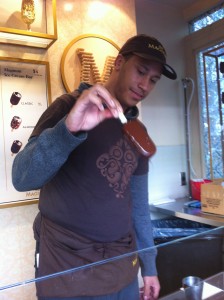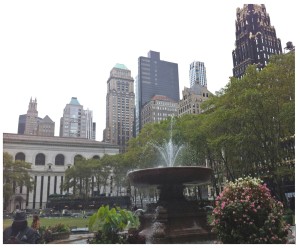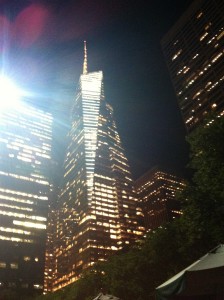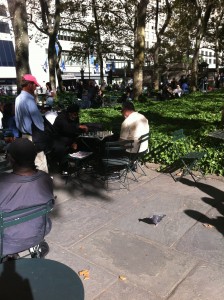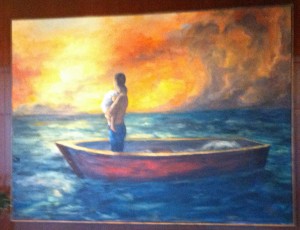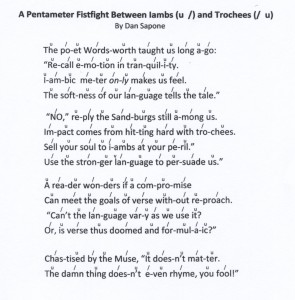Celebrating National Poetry Month — Welcome Back to ConVivio
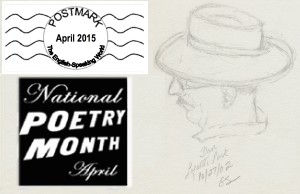 OK, so National Poetry Month is as good an excuse as any to welcome you back to ConVivio —
OK, so National Poetry Month is as good an excuse as any to welcome you back to ConVivio —
Welcome back! It’s been awhile. How’ve you been? Some of you with long memories may remember that I started this blog around harvest time in 2009, and named it after our little amateur winery. In Italian, ConVivio means “festival.” In English, it derives from words like welcoming, friendly, lively, and hospitable — literally “with life.” I began this experiment in storytelling to celebrate all things related to that broad theme. Our media include fiction, non-fiction, poetry, art, travel, music, food, and wine — in no particular order. Today, we re-introduce ConVivio in honor of National Poetry Month, just as we did five years ago this month, with a handful of poems. Even though my own writing is mostly prose, I have long been an admirer of poetry and poetic language. I would like to dispel the notion that poetry is somehow an old, dead art, forced on young people by vengeful English teachers to build character through suffering. I assert that poetry is alive and well and found giving pleasure in a number of places in popular culture. Some of our best known writers of prose are also purveyors of artful language.
The poems I offer today have at least one thing on common — each was written in response to another ‘work of art.’ I include my own unspectacular attempts at poetry and those of a few much more accomplished living poets. You are welcome to participate today, and in the future, by reading what you find here and, if you feel the urge, responding with your own comments and contributions, using the “comments” field at the end of each post. We hope you will join us here often.
============================
A Local Tri-Valley Poet: Lauren de Vore
Since we’re honoring National Poetry Month, it seems appropriate to start with “what is poetry?” Contrary to what some may think, poetry is not an archaic genre or something forced on schoolchildren to inflict pain. Rather poetry is for everyman and by everyman, as relevant today as in the time of Homer and before. As Lauren says…
Poetry Is
by Lauren de Vore (April 14, 2015)
Poetry is a song Poetry is outrage
Where the words themselves For times when prose
Make the music. Is insufficient.
Poetry is a painting Poetry is passion
By hands inept In all its excess
With pigment and brush. And abandon.
Poetry is a love letter Poetry is laughter
For a heart too shy For the simple joys
To speak the words. Of everyday life.
Poetry is the pulse Poetry is crystal
Of memory Pure and transparent
Echoing round the fire. As clear water.
Poetry is a rainbow Poetry is profound
Of dreams tinted Fathomless and dark
With rhythm and rhyme. As the human soul.
Poetry is a prayer Poetry is ageless
Where the poet cries Timeless for as long
Out to his god. As man has words.
This is whiter space without any text at all Poetry is.
============================
Next is a poem I started to write while Gretta and I were sitting in Bryant Park in midtown Manhattan and finished a few blocks away in the lobby of the Algonquin Hotel (where much greater writers did their work in times gone by). What struck me most about Bryant Park was its rhythm — and island of green at the center of the world’s most intense city. This poem is inspired by the rhythm of another poem (OK, a song lyric) by Antonio Carlos Jobim. So, it is truly a response to two other works of art: Jobim’s Waters of March (copied below my poem for your comparison) and Bryant Park itself — a work of urban art on a large scale. It is an experiment in rhythm and image.
Bryant Park: An Island of New York Rhythms Amid the Tall City
By Dan Sapone
Rhythmic inspiration provided by Antonio Carlos Jobim (see below)
A step
outside
both ways to the park
past the guys playing chess
until long after dark.
And the park is alive with the young and the old
reading books on iPads eating ice cream that’s sold . . .
right here
right now
‘mid the tall glass and steel,
‘round this island of green,
where the jugglers are real.
To see and be seen all four classes are there:
Low, middle, and high, and “I don’t really care.”
A beer
A dog
And some ‘kraut on a roll
with a pickle and chips
it’s all food for the soul.
Oh, there’s nori on sushi, and wasabi peas
Chorizo, chipotle, chiabata, and cheese.
Bizz-ness,
all kinds,
being done all around
selling personal jets
and some stuff on the ground.
And the rhythm of now is as old as the land;
it’s as new as the kids playing marbles in sand.
Non-stop
You hear
Varied sounds of the day.
It’s a city at work.
It’s a city at play.
Taxis, busses, and bikes’ polyphonic cacophony,
plays a twenty-first-century version of harmony.
Destination, way station, place to go and to be,
here together alone, plugged in cordlessly.
At night
Gets dark?
No, no, not at all,
For the bright-lit skyscrapers
Shine down on us all.
It changes from everyone’s front porch and yard,
To comf’terble living room with ceiling that’s starred.
It’s here; it’s now; it’s there; it’s then.
And the change ev’ry hour brings us back again . . .
Why here?
Why now?
Are we looking inside?
Or escaping a burden
in plain sight to hide?
In the world spinning faster and faster each day,
We ask, “Will it carry us near or away?”
Our park answers softly, “You can stay just right here.
I’m not changing, honest, you’ve nothing to fear.”
============================
In 2001, “Águas de Março” was named as the all-time best Brazilian song in a poll of Brazilian journalists, musicians and other artists. The central metaphor of The Waters of March gives the impression of the passing of daily life and its progression towards death, just as the rains of March mark the end of a Brazilian summer. But, the translated lyrics speak of “the promise of life,” “the joy in your heart,” and the “promise of spring,” suggesting a much more affirming theme. [iTunes will bring Jane Monheit’s wonderful performance of this song to your iPhone for ninety-nine cents.]
The Waters of March
By Antonio Carlos Jobim
A stick,
a stone,
it’s the end of the road,
It’s the rest of a stump,
it’s a little alone.
It’s a sliver of glass, it is life, it’s the sun
It is night, it is death, it’s a trap, it’s a gun.
The oak when it blooms,
a fox in the brush,
the knot in the wood,
the song of a thrush.
The will of the wind, a cliff, a fall
A scratch, a lump, it is nothing at all.
It’s the wind blowing free,
it’s the end of the slope.
It’s a beam, it’s a void,
it’s a hunch, it’s a hope
And the riverbank talks of the waters of March
It’s the end of all strain, it’s the joy in your heart.
The foot,
the ground,
the flesh and the bone
The beat of the road, a slingshot’s stone.
A fish, a flash, a silvery glow
A fight, a bet, the range of a bow.
The bed of the well, the end of the line,
The dismay in the face, it’s a loss, it’s a find.
A spear, a spike, a point, a nail
A drip, a drop, the end of the tale.
A truckload of bricks in the soft morning light
The sound of a shot in the dead of the night
A mile, a must, a thrust, a bump,
It’s a girl, it’s a rhyme, it’s a cold, it’s the mumps.
The plan of the house, the body in bed
And the car that got stuck, it’s the mud, it’s the mud.
A float, a drift,
a flight, a wing
A hawk, a quail,
the promise of spring.
And the riverbank talks of the waters of March
It’s the promise of life, it’s the joy in your heart.
A snake,
a stick,
it is John, it is Joe,
It’s a thorn on your hand and a cut in your toe.
A point, a grain, a bee, a bite
A blink, a buzzard, a sudden stroke of night.
A pin,
a needle,
a sting, a pain
A snail, a riddle, a wasp or a stain.
A pass in the mountains, a horse and a mule
In the distance the shelves rode three shadows of blue.
And the river bank talks of the waters of March
It’s the promise of life in your heart, in your heart.
A stick, a stone, the end of the road,
The rest of a stump, a lonesome road.
A sliver of glass, a life, the sun,
A knife, a death, the end of the run.
And the river bank talks of the waters of March
It’s the end of all strain, it’s the joy in your heart.
==================
Inspiration from The Lady in the Harbor
Lauren wrote this poem in response to two other works of art: Emma Lazarus’ famous 1883 poem The New Colossus (copied below this one), and the colossal work of art that inspired that poem, The Statue of Liberty, in New York Harbor.
Cry Shame
By Lauren de Vore (September 5, 2014)
I. Hypocrisy
Not like Ms. Liberty whose outstretched hand
And flaming torch did bid world-wide welcome
To exiles seeking sanctuary from
Injustice in their far-off native land,
A barrier in fact and mind’s been built
Against newcomers yearning to breathe free.
Whence came such coldness and hypocrisy?
Have we forgotten all the blood t’was spilt
For freedom’s sake on foreign shores that would
Deny such liberation here at home?
I fear America is passing into gloam
When we forget for what this country stood.
A travesty, the border fence doth shout
“You homeless, poor, and tempest-tost—keep out!”
II. Truths Self-Evident
How short and fickle is the memory
Of those who’d shut this country’s golden door,
And in the closing guilefully ignore
That not so long ago t’was they, t’was we
Who were the immigrants. For then, as now,
The hunger for a better life didst drive
Us all to seek a place where we could thrive,
A land where founding fathers did avow
As truths self-evident that all men are
Created equal, with God-given right
To life and liberty and chance to fight
For happiness ‘neath freedom’s beacon star.
That which was true for generations past
Still’s true for all the wretched and outcast.
III. Cry Shame
Cry shame on all false patriots, on all
Who smirch their heritage fear-mongering
‘Gainst incomers with nonwhite skin, who sling
Their vitriol on any who’d forestall
Such bigotry. There is no honor in
A land that claims to champion liberty
Yet fences out th’oppressed, that piously
Hides prejudice behind flag-waving din.
Who dares’t forget this country’s built upon
The blood and backs of immigrants? They are
Our past, they are our future too, they are
America. If welcome be withdrawn,
Our day will dim, our greatness fade away
Unless Ms. Liberty re-light our way.
==================
And here is the original, when times were different . . .
The New Colossus
By Emma Lazarus (1883)
Not like the brazen giant of Greek fame,
With conquering limbs astride from land to land;
Here at our sea-washed, sunset gates shall stand
A mighty woman with a torch, whose flame
Is the imprisoned lightning, and her name
Mother of Exiles. From her beacon-hand
Glows world-wide welcome; her mild eyes command
The air-bridged harbor that twin cities frame.
“Keep, ancient lands, your storied pomp!” cries she
With silent lips. “Give me your tired, your poor,
Your huddled masses yearning to breathe free,
The wretched refuse of your teeming shore.
Send these, the homeless, tempest-tost to me,
I lift my lamp beside the golden door!”
==================
This next poem, was inspired by a painting Gretta and I discovered in a hotel lobby in Philadelphia on our way to the patio at the back of the hotel beside the river. Walking into the hotel for the first time, the painting called Figures In a Boat by a local artist, caught my attention and made me ask, “What’s the story?” I recorded that first impression in the first part of the poem (“First Look”). At the end of the afternoon, walking back through the lobby past the painting again, it made a different impression, recorded in “Second Look.” THEN, after I sent a copy of the poem and the photo to my nephew Joseph Faletti, he reported that he saw it an entirely different way. His poem, A Different Look, is copied below mine. Joe Faletti is not a poet, or so he says. But as a programmer and software designer he is quite accustomed to making ideas to fit within a predetermined framework. So given the topic and structure he saw in First Look, Second Look, he was able to fit words for the different vision he saw in reaction to what I had seen. He also grew up with an artistic sensibility for the harmonious merger of words, images, and powerful feelings.
First Look
By Dan Sapone (October 2013)
Not alone Here
Accompanied only by responsibility For the one with all the burden
on a wine-dark sea, no oar propels nor rudder guides.
before a fearful scene, Mercy, we must hope, resides in other hands
she stands, and looks, and wonders. if it lives at all.
Here Now
The sea below and sky above No wave nor tide nor wind-filled sail
do not meet with usual grace. moves us anywhere but here.
Between the two, But where to go?
the horizon burns Where is home?
with violence and anger. Were we transported here for safety?
There Or did we drift here into danger?
Do the flames a homeland burn? Was it inattention, mindful negligence, or trust,
Whose? Mine? that brought us here?
An unintended consequence in pursuit of warmth?
Or did someone choose to burn it down, And I
a preferred replacement to install? Sleeping on a steady shoulder
Will the sea between us and danger knowing none of this,
quench the flames can only sleep
us carry safely to a calmer port to wake into whatever destination
or to destruction? that awaits.
Second Look
By Dan Sapone
Alone Here
Accompanied only by the future The one who holds the promise
on hopeful waters, Needs no oar nor rudder to arrive.
before a welcome dawn, Welcome, we learn, resides in other hands
she stands, and looks, and knows. Stretched out to us.
Here Now
Stars that ruled the night An ebbing tide is all it takes
are washed away by a warming sun. to draw us home on well-lit waters
The sky and sea, alike in darkness, Lest we drift away to danger,
conspire to reveal a destination must it be earned
ripe with promise, as the light ascends. through attention, vigilance, and trust
There that brought us here?
Does home await in this morning light? And I
Theirs? And now mine, ours? Sleeping on a steady shoulder
Will the light that brought them here Knowing none of this,
give sight as well to other eyes. can only sleep
What did they offer? to wake into whatever destination
What do we? that awaits.
A Different Look
By Joe Faletti (inspired by First Look, Second Look by Dan Sapone)
Part of a chain
Filled with relief – and awe,
on a wind-swept lake,
as the never-old dawn diffuses through the fog;
he absorbs the moment, and the tossings as of the boat
and is content.
Here
His father taught him to fish here,
arising in darkness to paddle into moonlight.
And to love the water, and the quiet,
and the soft, steady, yet random undulation
and the arrival of dawn –
time to return to land and breakfast.
And perhaps a nap!
There
The wife and mother sleeps in comfort,
secure in the knowing that all is well,
because all is quiet.
Or is she still uneasy —
unable to rest completely,
sensing the half-empty bed
and the empty crib nearby.
Here
The new father sighs at his success
in comforting a colicky child
less desperately than driving the pitted lake road.
And revels in the warm cushion
of a sleeping child, breathing quietly
beside his ear.
Now
One task remains,
more daunting than the recent triumph:
To row back to the dock,
climb the ladder,
and place the baby in a waiting crib,
without disturbing its sleep.
Perhaps he’ll stay
and watch the sun rise a bit longer!
And I
Relaxed and secure in his strong hold,
knowing none of this,
can only sleep
and dream of past and present.
=========================
Of course, many of us — certainly of my generation — have experienced poetry in song lyrics almost more than any other way. I would be remiss if I didn’t acknowledge National Poetry Month without one especially poetic song. Again, this one is a poem written in response to another work of art and its artist, Vincent Van Gogh.
Vincent (Starry, Starry Night)
by Don McLean (inspired by Starry Night by Vincent Van Gogh)
Paint your palette blue and gray
Look out on a summer’s day
With eyes that know the darkness in my soul.
Shadows on the hills
Sketch the trees and the daffodils
Catch the breeze and the winter chills
In colors on the snowy linen land.
This is a blank line
Now I understand
What you tried to say to me
And how you suffered for your sanity
And how you tried to set them free.
They would not listen, they did not know how
Perhaps they’ll listen now.
This is a blank line
Starry, starry night
Flaming flowers that brightly blaze
Swirling clouds in violet haze
Reflect in Vincent’s eyes of china blue
Colors changing hue.
Morning fields of amber grain
Weathered faces lined in pain
Are soothed beneath the artist’s loving hand.
This is a blank line
Now I understand
What you tried to say to me
And how you suffered for your sanity
And how you tried to set them free.
They would not listen, they did not know how
Perhaps they’ll listen now.
This is a blank line
For they could not love you
But still your love was true
And when no hope was left in sight
On that starry, starry night,
You took your life, as lovers often do.
But I could’ve told you, Vincent,
This world was never meant for
One as beautiful as you.
This is a blank line
Starry, starry night
Portraits hung in empty halls
Frame-less heads on nameless walls
With eyes that watch the world and can’t forget
Like the strangers that you’ve met.
The ragged men in ragged clothes
The silver thorn of bloody rose
Lie crushed and broken on the virgin snow.
This is a blank line e
Now I think I know
What you tried to say to me
And how you suffered for your sanity
And how you tried to set them free
They would not listen, they’re not listening still
Perhaps they never will.
===========================
A Pentameter Fistfight Between Iambs (u /) and Trochees (/ u)
by Dan Sapone (2014)
And now something ridiculous for those who remember, from freshman English class, being taught about the strategic use of iambic pentameter vs trochaic pentameter (right, I’m talking about you). It is poetry making fun of itself — because — poetry is supposed to be fun. [Sorry about the blurry image — ain’t technology grand?]
===========================
Our last poem is another by our own local poet, Lauren de Vore. It’s a bit of a teaser — in two weeks, ConVivio will feature an entire post featuring a set of Lauren’s poems. This one is written in the classic sonnet form —about sonnets . . . well sort of.
Poetical Tweets
Sententious and obscure, archaic with
It’s prejudice ‘gainst feet trochaic, curse
Of students forced to parse the poet’s pith.
One hundred forty syllables is all,
Three quatrains and a couplet short and sweet,
Profane, profound or scribbling on a wall.
A free-for-all. The art is knowing when
To bend or break the rules as best befits
The poet’s vision and the poem’s zen.
Tweet sonnets from the subways and sidewalks.
Well, I hope you enjoyed this little tribute to National Poetry Month. If you got this far, let us know what you think.
Although I don’t agree with everything in the articles below, if you’d like some further reading: try this:
http://www.huffingtonpost.com/pam-allyn/why-poetry-matters_b_5185399.html
Or this: http://www.edgemagazine.net/2012/08/why-poetry-matters/
–> Next week: look for a piece of prose — this time a column about the place that Gretta and I have decided is our favorite place in all the world.
Regards — PapaDan
